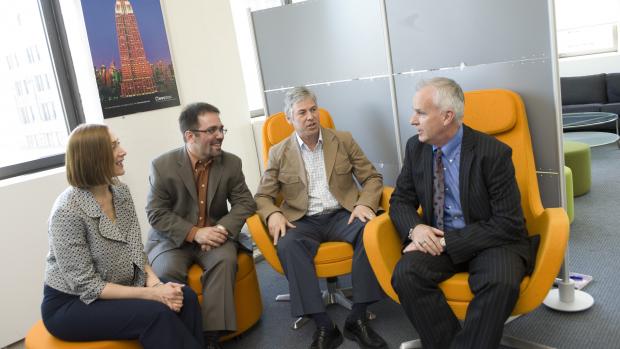An Urban-focused Executive Education in Clean Technology

Projects emerging from Polytechnic Institute of NYU’s first CleantechExecs cohort could help New York City strengthen its green economy and lighten its impact on the environment.
In May, 25 executives and entrepreneurs, with successful, decades-long careers representing diverse sectors such as finance, IT and telecom, construction, architecture, biochemistry, and non-profits, presented business plans and strategies for new cleanteach businesses or projects. The endeavors synthesized what they had learned and applied during the CleantechExecs program created by NYU-Poly and the New York State Energy Research and Development Authority (NYSERDA). The program’s 13 daylong seminars and site visits, which began in February, concentrated on the challenges and opportunities professionals looking to transition into cleantech roles or start cleantech companies will face in urban markets.
Property manager Paul Rabinovitch’s team pitched an idea for a real estate fund that will buy and retrofit the least desirable, most energy-inefficient apartment buildings for sale. On average, 30 – 50 percent of a building’s costs go toward heating, cooling, and lighting. A portfolio of buildings that is cheaper to run than competitors’ would be a profitable investment, according to the team. And the troubled real estate market’s lowered prices may make it an ideal time to assemble that portfolio.
Buildings weren’t the only focus of retrofits. Drum River, a Suffolk County-based company that installs and designs solar panels, received a strategic makeover. Henri Rivers, a CleantechExecs participant and Drum River’s CEO and founder, and his teammates studied the company to see how it could boost business. Their strategy: market to a community in Babylon, NY with government incentives to add solar electrical and thermal systems to their homes. Kalle Levon, NYU-Poly professor of chemical and biological science, served as a subject-matter expert for the team.
NYU-Poly’s Brooklyn campus was the topic of Montrose (Monty) Graham’s group. The team of marketers, lawyers, engineers, and technologists proposed a graduated approach to greening the campus. Initial steps involve load shedding — i.e., shutting down lights and other appliances for select hours — to conserve a surprisingly substantial amount of electricity. The pinnacle — and most ambitious — piece of “greening NYU-Poly” is turning the campus and its surrounding MetroTech neighbors into an energy-independent district, complete with a micro-grid.
“New York City emits 1/2 of 1 percent of all carbon emissions in the U.S., and 80 percent of that comes from buildings. By greening NYU-Poly, we meet the problem head on,” explained Graham of why his team chose its project. “Further, we see an extraordinary opportunity to blend cleantech retrofits at NYU-Poly with an expanded, ‘hands-on’ curriculum that uses actual projects at NYU-Poly as ‘living labs.’”
Giving back motivated the team, as well. A NYSERDA grant funded the program’s first cohort who can apply the credits to an NYU-Poly master’s program. “We are all grateful for the opportunity to participate, and we all benefited tremendously,” said Graham.
Graham and teammate David De Armas praised networking opportunities and the diversity of participant experience. “We were able to learn much from each other and peeled away at the complexity of clean technology,” said De Armas. “I intend to be in this field for a long time and the passion and intelligence of the people in this program inspired me.”
Raphael Carty, whose computer industry career began in Silicon Valley, focused his group’s work on the intersection of information technology and the smart grid, including smarter monitoring of energy usage. Carty has worked for HP and other big IT companies and has been involved with startups in the past. Software that supports the smart grid is a sweet spot for a new venture according to Carty. “I’m continuing to learn how technology is applied in this space,” he says. “It’s an ongoing process. This program is a leaping off point.”
Like De Armas, Carty commented on how the program helped him understand the complicated nature of creating and leading a cleantech company. “The energy market is very complex,” Carty says. “The class helped identify the players. And the good thing is that technology can simplify things.”
The CleantechExecs curriculum was created by Mel Horwitch, professor of technology management at Polytechnic Institute of NYU and Ari Ginsberg, professor of management and entrepreneurship at NYU’s Leonard N. Stern School of Business. Classes meet at NYC ACRE, NYU-Poly’s cleantech incubator in Manhattan.




